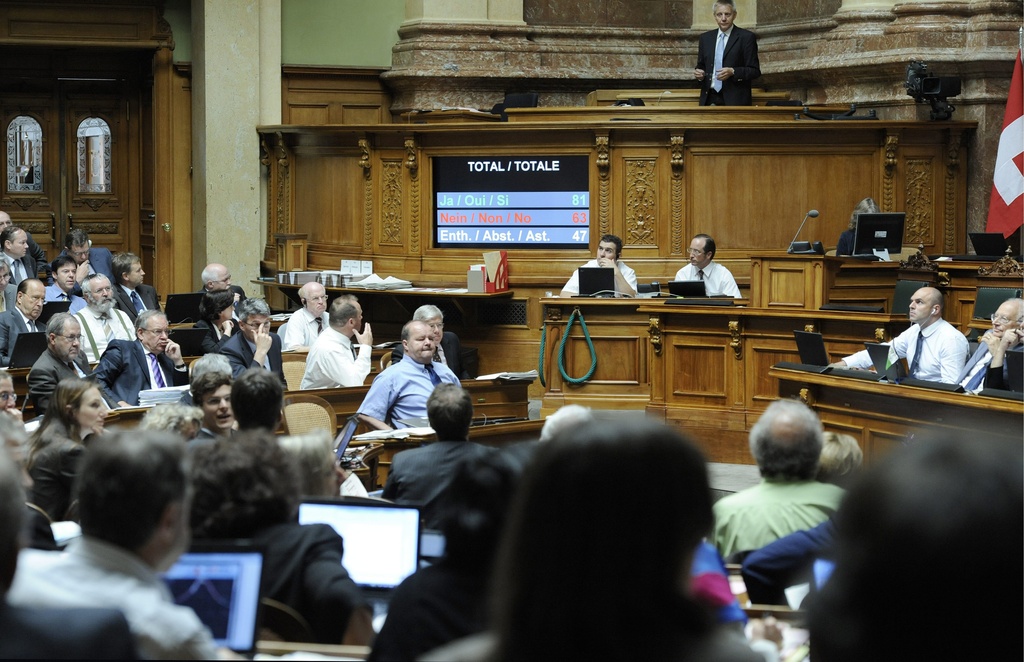Switzerland complies as US tax deadline passes

The Swiss tax authorities say they have met Thursday’s deadline for examining the cases of about 4,450 United States clients of the UBS bank, suspected of tax offences.
The State Secretariat for International Financial Matters (SIF), issued a statement saying that the Federal Tax Administration (FTA) had “issued the corresponding conclusive decrees” on the cases, as it was obliged to do by an agreement signed last August between Switzerland and the US.
Client data in about half the cases has already been supplied to the US, and delivery will “be largely concluded by autumn 2010”, the statement added.
The Swiss Federal Tax Administration had about 40 experts processing the data of alleged tax evaders, Mario Tuor, a spokesman for the SIF told swissinfo.ch earlier.
Michael Ambühl, the state secretary for International Financial and Tax Matters, said last week he believed Swiss banks should not run into further trouble with the US taxman.
Switzerland and UBS have signed an accord to disclose details of the US accounts at UBS thereby settling a long dispute.
However, the UBS clients had the possibility of going to court to fight the handover of their data.
By the end of July there were around 300 cases which were either still being heard by the courts or where it had been decided, after examination of the data, that the information should not be passed on, Tuor said.
At the moment 57 appeals from US clients are still pending at the Federal Administrative Court. A court decision in the middle of July, rejecting one client’s appeal not to have her data handed over, is likely to apply to 40 of these remaining cases.
Court spokesman Andrea Arcidiacono confirmed media reports that 120 appeals had been submitted between May and August.
“We expect”
The US Internal Revenue Service (IRS) made it clear at the beginning of April that it expected Switzerland to implement the terms of a bilateral treaty, which was ratified by the Swiss parliament in June, and hand over the data.
It warned that the authorities would consider legal action should Switzerland fail to comply.
However, the SIF statement said talks were being held about the final state of implementation of the agreement, and that both parties were “optimistic that the US authorities will receive most of the agreed account information within a reasonable period of time.”
The IRS/UBS story goes back to December 2007 when the Russian-American billionaire Igor Olenicoff pleaded guilty to evading the taxman via UBS accounts. He paid heavy fines and then took action against the bank.
The IRS had been tipped off about Olenicoff by UBS banker Bradley Birkenfeld, who is in jail serving a 40-month sentence for his part in UBS operations.
In June 2008, the IRS demanded details of 52,000 accounts held by US clients of UBS. Five months later UBS manager Raoul Weil was indicted on charges of helping wealthy American clients evade taxes with false documents.
Bilateral treaty
The Swiss government in August last year signed a bilateral treaty with the US to try to solve the issue. It foresaw the handing over of about 4,450 account details of the main suspected tax offenders. The move was to crack banking secrecy.
But in January 2010 the Administrative Court ruled that the handover of client data was illegal. Finally, the summer session of parliament, after much debating of the pros and cons, voted in favour of the treaty – to the great relief of the government.
In October 2008, UBS had to be given a SFr60-billion bailout by the state. It has now embarked on an expensive campaign to improve its tarnished image and that of Switzerland as a financial centre.
Experts around the world agree that the sheer size of banks like UBS that are “too big to fail” poses a serious risk for states, and an international consensus is growing that banks should have more liquid assets and equity capital. But the banks – including UBS and Credit Suisse – want none of it.
They are lobbying hard against such reform proposals. UBS chief executive Oswald Grübel warned in interviews with Swiss newspapers in June that tougher rules on equity capital would destroy jobs and hinder future growth.
“Too big to fail”
Swiss politicians are determined that the state should never again have to rescue a major bank that has got itself into trouble through its own high risk business practices.
The government set up a group of experts to report on the “too big to fail” problem. But the results of their investigation have been delayed, and the promised proposals for tougher bank regulation will not be produced by the end of August.
“The aim is to prevent a second UBS case,” explained Ambühl, who has been head of the SIF since March.
Switzerland does not want to find itself on a black list “every other week”, he told swissinfo.ch.
Jean-Michel Berthoud, swissinfo.ch (Adapted from German by Julia Slater)
With 9.8% of Swiss exports (SFr17.7 billion) in 2009, the US was again the second-most important export partner, behind Germany (19.5%), but ahead of Italy (8.6%) and France (8.4%). Exports to the US were more than triple those to China.
Exports to the US saw a reduction of 9.6% as a result of the financial crisis. US exports to Switzerland decreased by 15% to SFr8 billion, but this figure was still larger than US exports to Finland, Norway, Sweden, Denmark and Austria combined.
Switzerland continues to enjoy a large trade surplus of SFr9.6 billion, the third-largest surplus in history.
Foreign direct investments continue to grow on both sides of the Atlantic: The US is still the largest foreign investor in Switzerland and increased investments in 2009 by 15%.
Swiss direct investments in the US increased by 10% and Switzerland is again the sixth-largest investor in the US, behind Germany, but ahead of France.
UBS is a global leader in wealth management. It employs 64,000 people. About 37% work in the US or Canada.
The bank announced on Monday it had signed an agreement to become a global partner of the sport.
UBS noted that Formula 1 was a year-round, highly visible, and popular sport with an especially strong presence in many of the bank’s key growth markets such as Asia, Middle East and Latin America.
It added that the long-term partnership would provide “excellent branding and hospitality opportunities that fit with UBS’s global footprint and business strategy”. No financial details were disclosed.
UBS previously sponsored Swiss yacht Alinghi, which won the America’s Cup in 2003 and 2007.

In compliance with the JTI standards
More: SWI swissinfo.ch certified by the Journalism Trust Initiative



You can find an overview of ongoing debates with our journalists here. Please join us!
If you want to start a conversation about a topic raised in this article or want to report factual errors, email us at english@swissinfo.ch.